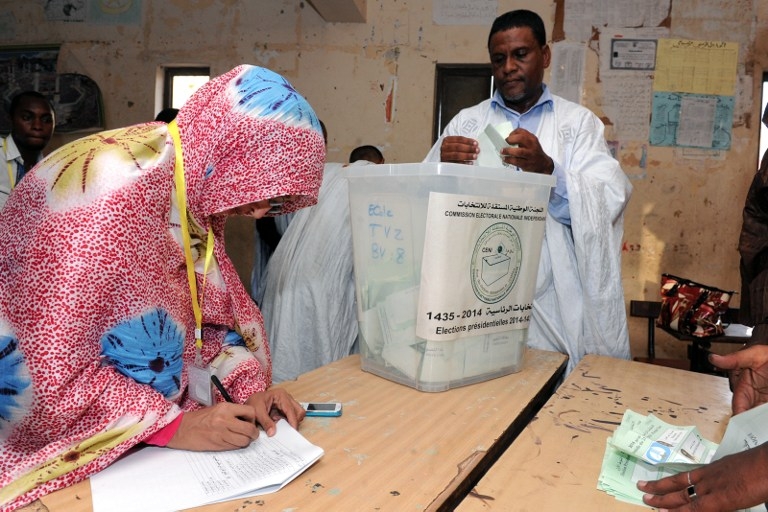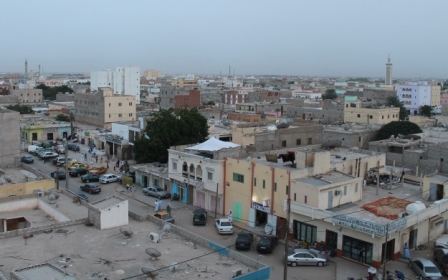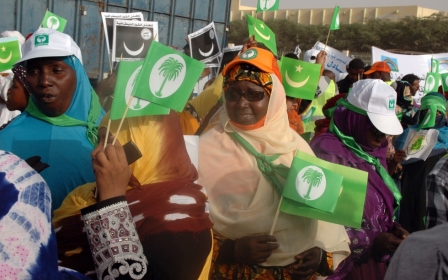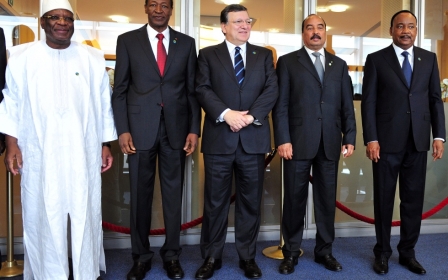Abdel Aziz likely to hold onto Mauritanian presidency in contentious elections

Mauritanians on Saturday voted in an election for their president, a position that incumbent Mohamed Ould Abdel Aziz is expected to secure as main opposition rivals boycotted the polls.
The ex-army general, who seized power in the northwest African nation in an August 2008 coup, has campaigned strongly on his success in fighting armed groups linked to Al-Qaeda at home and in neighbouring Sahel nations.
Abdel Aziz's campaign was reportedly boosted by $200 million from Algeria which has an interest in Mauritania as a result of its decades-long diplomatic stand off against Morocco over the Western Sahara.
Seventy-year-old voter Brahim said the country, wracked by violence up until 2010, "had found peace."
"That's important and I want it to continue because peace is irreplaceable."
Kidnappings and attacks by Al-Qaeda in the Islamic Maghreb (AQIM) were frequent when Abdel Aziz came to power, but he boasts that he has turned his nation into a regional haven of peace thanks to his reorganisation of the military and security forces.
"The first point where Abdel Aziz's success is undeniable is indeed that of security and stability in the country, driving away the spectre of the terrorist threat," said Mohamed Fall Ould Oumeire, managing editor of the daily La Tribune.
The Muslim republic is seen by Western leaders as a bulwark against Al-Qaeda-linked groups.
In 2010 and 2011, Mauritanian troops carried out successful "preventative" raids on AQIM bases in neighbouring Mali, before the armed militants could carry out planned attacks on Mauritania.
Abdel Aziz has also been heavily involved as head of the African Union in efforts to end conflict in Mali, which lost half its territory to Islamist militants in 2012, prompting a French intervention to free the towns.
He has also mediated between separatist Tuareg rebels and the government in Bamako.
But while many voters expressed support for Abdel Aziz's gains against militants, even his supporters were not content with security alone.
The president "has achieved a lot for Mauritania, but we ask him for more," said Ould Bahaya Ikebra, a civil servant.
"We call on him to fight against unemployment, increase wages and lower prices," he said.
Allegations of fraud
But opposition critics argue that the price of peace has been authoritarian rule and have decided to boycott a vote they regard as a sham.
Main opposition parties have never accepted Abdel Aziz's 2009 victory in an election they said was marred by massive fraud.
The ruling Union for the Republic won a large majority in parliamentary and local elections last year, which were also boycotted by the opposition.
Casting his vote, Abdel Aziz said he "did not fear a strong rate of abstention" and attacked the opposition, saying: "The reality is that there are certain people who can no longer obtain the results they got in the past."
The National Forum for Democracy and Unity - an opposition coalition of 11 parties including a moderate Islamist movement - rallied to denounce Abdel Aziz's ‘dictatorial power’ and were counting on a high abstention rate.
But as of 1700 GMT on Saturday, turnout was 46 percent, a source close to the Independent Electoral Commission told AFP - more or less consistent with previous presidential elections.
Sidi Ould Babamine, who leads the National Forum for Democracy and Unity, Mauritania’s main opposition bloc which has boycotted the vote, said in a statement that voting turnout did not exceed 30 percent and accused authorities of rigging the results.
Unofficial results announced by state radio on behalf of the electoral commission signal considerable advancement for Abdel-Aziz over his four other competitors.
Abdel Aziz has four challengers that highlight many of the country's sensitive issues such as complex race relations between black Mauritanians and the dominant Arabs.
The only candidate from the black African south is Ibrahima Moctar Sarr, who argues that non-Arab Mauritanians are marginalised.
Another contender is Biram Ould Dah Ould Abeid, who heads a movement to end slavery which, while officially abolished in 1981, persists as a deeply entrenched practice documented by rights groups.
A descendant of slaves, Ould Abeid proclaims himself “the sole candidate drawn from disadvantaged levels of the people".
The only woman candidate is Lalla Mariem Mint Moulaye Idriss, 57, who has held several administrative posts and seeks support from fellow women and the youth.
While the country, which is nearly as big as Egypt, remains poor, it boasted a growth rate of six percent in 2013. Mauritania has produced oil since 2006 and is rich in iron ore as well as fish caught off its Atlantic coastline.
The electoral commission will declare the official results on Sunday evening, according to Anadolu Agency sources.
New MEE newsletter: Jerusalem Dispatch
Sign up to get the latest insights and analysis on Israel-Palestine, alongside Turkey Unpacked and other MEE newsletters
Middle East Eye delivers independent and unrivalled coverage and analysis of the Middle East, North Africa and beyond. To learn more about republishing this content and the associated fees, please fill out this form. More about MEE can be found here.




